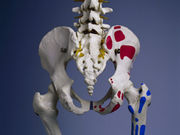Women in highest quintile of aMED index have significantly lower risk for hip, not total, fractures
MONDAY, March 28, 2016 (HealthDay News) — Adherence to a Mediterranean diet is associated with reduced risk of hip fracture, according to a study published online March 28 in JAMA Internal Medicine.
Bernhard Haring, M.D., M.P.H., from the University of Würzburg in Germany, and colleagues conducted a post-hoc analysis of longitudinal data from 90,014 postmenopausal women included in the Women’s Health Initiative (WHI) observational study. Nutrient and food intake at baseline was derived from the WHI food frequency questionnaire. Diet quality and adherence were assessed based on scores on the alternate Mediterranean Diet (aMED) index; the Healthy Eating Index 2010 (HEI-2010); the Alternate Healthy Eating Index 2010 (AHEI-2010); or the Dietary Approaches to Stop Hypertension (DASH) score.
The researchers identified 2,121 cases of hip fracture and 28,718 cases of total fractures during a median follow-up of 15.9 years. The risk of hip fracture was lower for women scoring in the highest quintile of the aMED index (hazard ratio, 0.80), with an absolute risk reduction of 0.29 percent and a number needed to treat of 342. There was no correlation between aMED score and total fractures. Higher HEI-2010 and DASH scores were inversely linked to the risk of hip fracture, but the results were not significant. There was no correlation for AHEI-2010 with hip or total fractures.
“Higher adherence to a Mediterranean diet is associated with a lower risk for hip fractures,” the authors write.
Copyright © 2016 HealthDay. All rights reserved.








